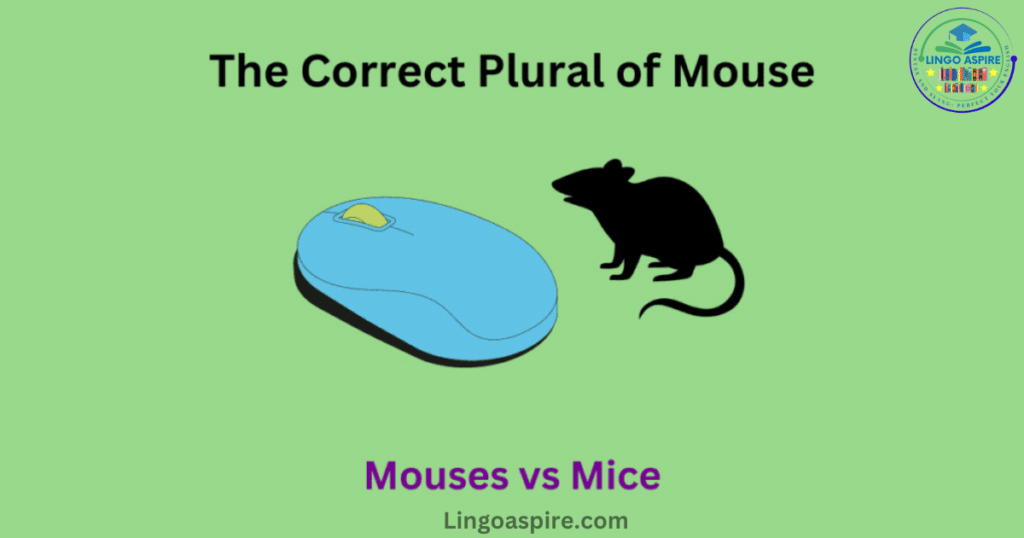The debate between mouses vs. mice has puzzled many English speakers, especially regarding the plural of the mouse. Is it mouses or mice? In this article, we will explore the differences, explain why mice are often the preferred term, and discuss how to use these terms correctly in various contexts. By the end, you’ll clearly understand the correct plural, whether you’re referring to computer mice or animal mice.
What Does the Word “Mouse” Mean?
Before diving into the plural of mouse, it’s essential to understand the meaning of the word itself. The term mouse can refer to two primary things: a small rodent and a computer device.
- Mouse (Rodent): The mouse as an animal is a small mammal, part of the rodent family. It is typically characterized by its small size, long tail, and pointed nose. There are many species of mice, and they can be found in various environments, from homes to fields.
- Computer Mouse: The computer mouse is a pointing device used to control the movement of a cursor on a screen. It has been an integral part of computer devices since the 1960s and continues to evolve, with options like ergonomic mouses and wireless mouses.
Understanding these two meanings helps us see why there might be confusion when deciding whether to use mouses or mice. The meaning determines which plural is appropriate.
The Plural of “Mouse” in Different Contexts

The confusion surrounding mouses vs. mice comes from the fact that the plural of mouse differs depending on the context. When talking about animal mice, the correct plural form is mice. However, when referring to a computer mouse, there is a bit more debate.
- Mice: The plural of mouse in biological terms is always mice. For example, if you’re talking about a group of rodents, you’d say, “There are many mice in the field.”
- Mouses: In contrast, when it comes to computer mice, some people use the term mouses, although mice is also widely accepted. The use of mouses is more common in informal contexts, particularly when referring to multiple mouse devices. For example, you might hear someone say, “I have several mouses on my desk.”
Despite this, mice is the more common choice, even when talking about computer devices, due to the similarity between the word’s biological and technological meanings.
What’s the Difference between Mouses vs. Mice?
| SPECT | MICE | MOUSES |
|---|---|---|
| Meaning | The plural form of mouse when referring to the rodent or computer device. | A non-standard plural form of mouse, often used informally for computer mice in casual speech. |
| Context | Used in both biological (animal) and technological (computer) contexts. | Primarily used informally in technology settings, specifically referring to multiple computer mice. |
| Grammatical Status | The correct plural form for both animal mice and computer mice in formal language. | Considered incorrect or non-standard in formal writing but occasionally used in everyday language, especially in tech contexts. |
| Pluralization Rule | Follows the irregular plural rule, like goose to geese. | Does not follow standard English pluralization rules and is often viewed as a mistake in formal English. |
| Usage in Sentences | “There are many mice in the house.” “I have a few mice for my computer.” |
“I have several mouses on my desk.” “The store sells different types of mouses.” |
| Standard or Non-standard | Standard plural in both the animal and computer device context. | Non-standard plural, typically used in informal or tech-related speech. |
Key Differences:
- Mice is the correct plural for both the rodent and the computer device in most contexts.
- Mouses is a non-standard plural, more commonly used in informal or technical conversations but should be avoided in formal writing or speech.
Why “Mouses” Is Incorrect in Most Cases
One of the main reasons mouses is often considered incorrect is that English follows a pattern of irregular pluralization when it comes to many nouns. Mice is an irregular plural because it doesn’t follow the standard rule of adding -s or -es to the singular form.
For example, the plural of goose is geese, not gooses. Similarly, mouse become mice rather than mouses. This pattern is common in English for some animal names, where the plural form doesn’t follow a regular rule. Therefore, while some people use mouses for computer devices, the standard plural of mouse in all contexts, including technology, should be mice.
Origins of the Word “Mouse”
The history of the word mouse provides important insight into why its plural form is mice. The term originates from Old English, where the word mūs referred to the small rodent. Over time, the word evolved into Middle English as mous, and the plural form was mice.
The mouse origin can also be traced back to Proto-Indo-European, where the word mus meant “mouse.” The pluralization rule for mice has remained consistent for centuries, making it an established part of the English language.
In contrast, the term computer mouse was coined in the 1960s as a handheld tool to control the movement of a cursor on a screen. While the tool shares the name of the rodent, the plural form of computer mouse was not immediately clear. However, the use of mice became standard, even in the tech world.
The Grammar Rule Behind Mouses vs. Mice
To understand why mice is often the correct plural form, we must look at the rules of English grammar. English has many irregular plural nouns, meaning they don’t follow the standard pluralization pattern of adding -s or -es. For example, man become men, and child become children.
Mouse follows this irregular pattern. The plural of mouse in the context of animals is mice, and this rule applies regardless of whether you’re discussing animal mice or computer mice.
However, mouses has found a place in some contexts. It is considered a non-standard plural but still appears in discussions about multiple mouse devices. That said, it’s always best to use mice in both contexts to avoid confusion and align with standard English grammar rules.
Real-Life Usage: When to Use Mouses vs. Mice
When deciding whether to use mice or mouses, it’s essential to consider the context. In formal and academic writing, you should always use mice when referring to the plural of mouse, regardless of whether you’re talking about rodents or technology.
For example, in a scientific article about rodents, you would say, “The researcher studied the behaviors of several mice.” In a tech-related article, you would write, “The computer technician repaired several mice.”
However, in informal contexts, particularly in the realm of technology, the use of mouses is acceptable. For example, if you’re chatting with a friend about your desk setup, you might say, “I have three mouses on my desk.” While this usage isn’t grammatically incorrect, it is less common than using mice.
In the end, understanding the difference between mice and mouses helps ensure you’re using the correct plural in the right context.
To help clarify the correct usage of mouse, mice, and mouses, here are examples that show how these terms should be used in different contexts:
Using Mouse, Mouses vs. Mice in Sentences

1. Mouse (Singular)
The word mouse is used when referring to a single item, whether it’s an animal or a computer device. Here are some examples:
- Animal: “The mouse scurried across the floor.”
- Computer Device: “I can’t find my mouse; it’s missing from my desk.”
2. Mice (Plural)
Mice is the correct plural form of mouse in almost all contexts. It is used when referring to more than one rodent or computer device.
- Animal (Rodent): “There are several mice in the house.”
- Computer Devices: “The office has five mice connected to various computers.”
Even in the tech world, mice is the more commonly accepted term for multiple computer devices.
3. Mouses (Non-Standard)
While mouses is occasionally used informally to refer to multiple computer mice, it is generally considered non-standard in formal writing. However, it may still appear in everyday conversation or in specific tech contexts.
- Informal (Computer Devices): “I have three mouses on my desk, each for a different computer.”
- Tech Usage: “The store sells different types of mouses, including wireless and ergonomic models.”
Summary:
- Use a mouse for one item, whether it’s an animal or a computer device.
- Use mice as the plural for both animals and computer devices in most situations.
- Mouses can be used informally but are non-standard for pluralizing computer mice.
Conclusion
The debate over mouses vs. mice is understandable, but the correct plural of mouse is usually mice. Whether you’re talking about animal mice or computer mice, mice is the standard plural form. Mouses, while used informally, is a non-standard plural and shouldn’t be used in formal writing or professional contexts.
Remember, mice plural is the most common and widely accepted form, and it follows the irregular pluralization rules of the English language. You can confidently use the term in any situation by understanding the mouse meaning, its origin, and the correct use of plural forms.
As the world of computing and technology continues to evolve, it’s important to keep up with language changes. But for now, when in doubt, always go with mice for the plural of mouse.
Sources
Grammarist: This article discusses the correct usage of “mice” and “mouses,” noting that while “mice” is the standard plural for both the rodent and the computer device, “mouses” is sometimes used informally in tech contexts.
Grammar Monster: This resource explains the standard and exceptional rules for forming plurals in English, highlighting that “mouse” changes to “mice” and that “computer mouse” can be either “computer mice” or “computer mouses,” with “computer mice” being far more popular.
Grammar Monster – Plural of Mouse
Scribbr: This article clarifies that “mice” is the correct plural form when referring to the rodent, and both “mice” and “mouses” are generally accepted for the computer accessory, though “mice” is more common.







